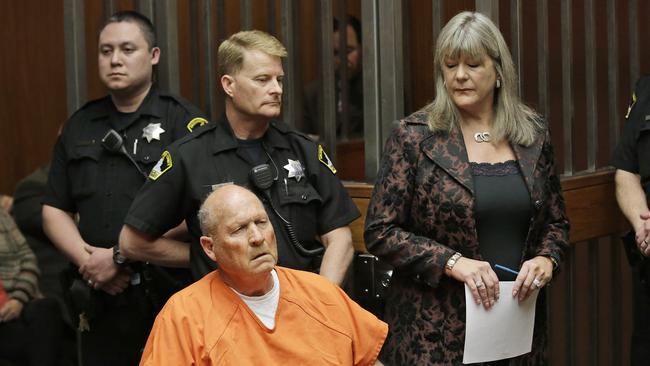Police turn to DNA in fight against crime
An explosion in DNA testing by people wanting to trace their family histories has opened a new frontier in crime fighting.

An explosion in DNA testing by people wanting to trace their family histories has opened a new frontier in crime fighting, with investigators expected to increasingly turn to the genetic information to solve difficult cases.
The arrest in the US last week of accused Golden State Killer Joseph DeAngelo has delivered a high-profile example of the potential for police to use the results of consumer DNA tests to solve crimes.
US authorities always had the DNA of the killer — wanted for 12 murders and at least 45 rapes in the 1970s and 80s — but had never found a match.
Their breakthrough came after they submitted the genetic profile of a DNA sample from a 1980 murder to a genealogy website, resulting in matches to distant relatives, according to US reports. Police then methodically worked through family trees with help from forensic genealogists and came across DeAngelo, obtaining his discarded DNA to confirm he was the wanted man.
Australian police forces say they have not used genealogy websites, but it looms as a powerful new tool for unidentified DNA samples in unsolved crimes such as murders and sexual assaults.

Paul Lacaze, head of public health genomics at Monash University, said with consumer DNA tests roughly doubling each year, it would “just become another arm of intelligence”.
“It would not come as a surprise to me if law enforcement agencies tried to gain access.
“The question is, should they be allowed to?” Dr Lacaze said.
“It’s a double-edged sword. On the one hand there needs to be respect for consumer privacy and consent provided.
“On the other hand there may be the opportunity to solve heinous crimes.”
Alice Schofield, 29, from Sydney, did an AncestryDNA test last year out of a family history interest and was contacted by fourth and fifth cousins.
She never considered it could at some point feature in a police investigation.
“If people were aware of that upfront I think they’d definitely be a bit more careful. It is a little bit scary, that you don’t know exactly what it could be used for in future,” she said.
Consumer DNA tests are offered by a range of online sites, allowing people to trace their family tree and be notified of relatives who have been tested.
“There has been about as much testing in the last year alone as there has been in all the previous years combined.
“It’s growing exponentially,” Dr Lacaze said.
US investigators submitted the Golden State Killer’s DNA profile to free online database GEDmatch, reportedly using a pseudonym and without a warrant or the site’s knowledge.
The site allows people to supply genetic information obtained from commercial tests to search for relatives.
It would be harder to access information from major consumer DNA testing companies.
Popular website 23andMe says it resists such requests and does not release information without consent “unless required by law”.
Ancestry.com’s transparency reports state there were no law enforcement requests for genetic information in the past three years, with only one before that.
A site spokeswoman said almost 10 million people had taken a test, but could not say how many Australians.
Dr Lacaze said it was a “matter of time” before authorities requested genetic information from the companies.
One case where police have said they had DNA and no match was a serial rapist wanted for 27 sexual assaults or attempts on women in Sydney’s eastern suburbs from 1985 to 2001.
A NSW Police Force spokeswoman yesterday said there had not yet been an arrest.
The NSW Police Force was “always open to explore new technologies”, but did not use ancestry sites for investigative purposes.
SA Police also said it did not use the sites.





To join the conversation, please log in. Don't have an account? Register
Join the conversation, you are commenting as Logout